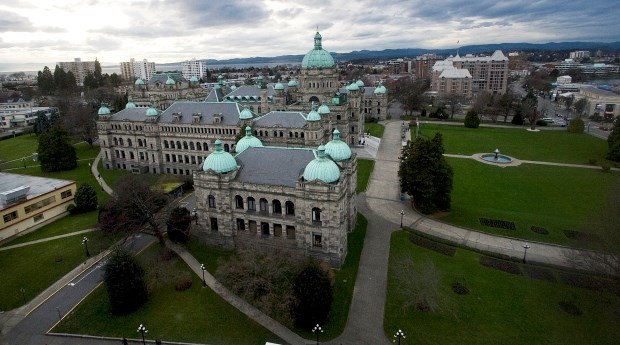 B.C. politicians staged a pre-debate debate Monday morning that made a couple of things clear.
B.C. politicians staged a pre-debate debate Monday morning that made a couple of things clear.
It was an hour-long free-for-all about proportional representation in advance of the televised debate Thursday evening between Premier John Horgan and Opposition Leader Andrew Wilkinson.
The first takeaway was that Horgan and Wilkinson should write their own lines. If they borrow from Monday’s test run, they’re going to run into trouble.
The second was how strongly the morning argument confirms the central failing of the referendum effort — it’s a political initiative from start to finish, with almost zero independent, non-partisan involvement.
That means every aspect, every word, every comma of the referendum and the proportional representation models are subject to partisan wrangling. Which is what the legislature’s warmup run for Thursday’s debate turned into in no time flat.
The cats sided with the cats. The dogs backed the dogs. Then they fought. Like cats and dogs.
NDP MLA Nick Simons said: “One of the best arguments for proportional representation is the record of the Liberal government.”
“Their government, since 2001, is the best reason that we need a proportional representation system in this province.”
But changing the rules of the game because you don’t like what your opponents did after they won is the least valid reason to vote for proportional representation.
The structure of the voting system shouldn’t depend on what you think of your opponent’s record. The system should be designed independently of politics.
The best argument for any voting system is whether it’s fair to voters, not whether it hinders your opponent’s chances.
The NDP and the Greens kept control of process every step of the way, however. That invites suspicions that it’s politically slanted in their favour, suspicions the Liberals are happy to jump on.
The actual motion that was tossed up for debate by the government was: “This house recognizes that 40 per cent of the popular vote should not equal 100 per cent of the legislative power.”
That’s the central thrust of the yes campaign, and it left the forces of no scrambling.
B.C. Liberal MLA Ben Stewart matched Simons’ partisan outlook, from the opposite vantage point.
He conceded the NDP has kept some promises, but questioned where the $400 renters’ grant, the hydro-rate freeze and the $10-a-day-child care have gone.
Those are issues with which the 16-month-old government has been grappling. But it’s hard to see what that has to do with voting on whether to change the electoral system, and to what.
Stewart highlighted all the clout the Green caucus currently has and said the motion should really say the house recognizes that 16 per cent of the popular vote should equal 100 per cent of the legislative power.
“That’s what a slim majority in this house seems to truly believe in supporting proportional representation,” he said.
But the current minority government that Stewart was criticizing developed under the existing voting system. It’s true proportional representation would likely guarantee more minority-government dickering and power-sharing. It can happen under nearly any system.
At least NDP MLA Spencer Chandra Herbert broke away from the partisan.
But he ventured into dodgy territory with a trick-or-treat analogy.
Under the current system, the kid with the most candies “gets to control all of the candies,” he said.
“Do some of the kids get some? No, actually, all the kids get no candies except for the one kid that got 25. That’s the first-past-the-post system.”
He supported the “better system” of co-operation.
Kids with 25, 20 and 15 candies work out how to share them.
But the runners-up in the candy count don’t get robbed of all their goodies under the current voting system. They still get to the house and are part of the system. They just don’t get to run the candy factory.
There was some over-reaching elsewhere on both sides, with inflated claims for and against. But the one thing missing was an objective assessment about the benefits and drawbacks.
Stewart closed his speech by saying the motion was “out to lunch.”
So were big chunks of the debate. It ended inconclusively. There’s a chance the referendum will conclude the same way.



